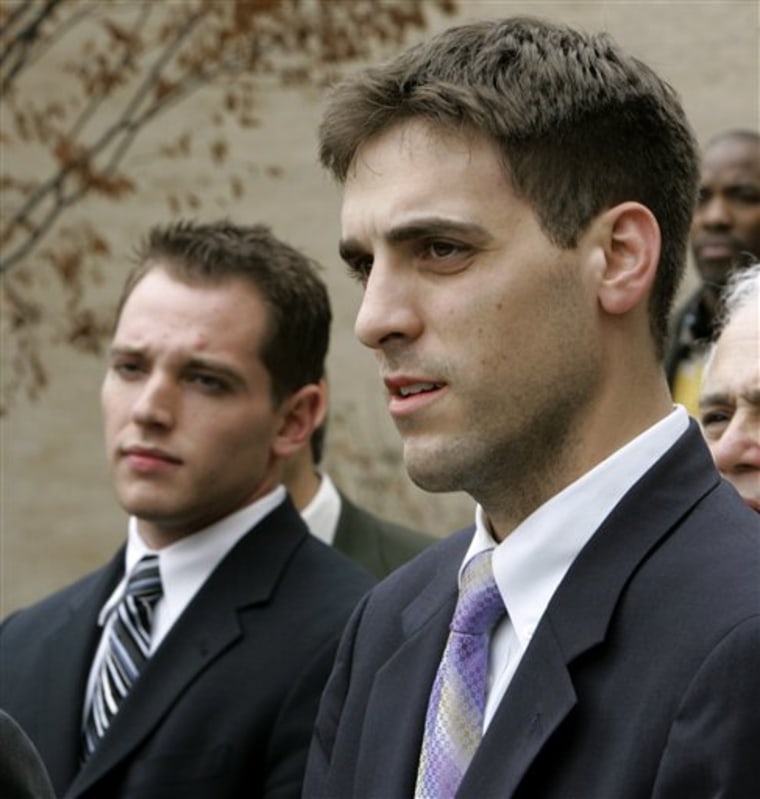Two former roommates who admitted they set a fire in a dormitory at Seton Hall University that killed three students were sentenced Friday to five years in prison.
Joseph T. LePore and Sean Ryan, both 26, admitted in November that they set the fire seven years ago. A plea bargain spared them from facing more than 30 years in prison if they had been convicted in a trial. Under the terms of the agreement, they could be eligible for parole in 16 months.
The state Department of Corrections will assess the defendants to determine what prison facility the pair will be assigned to.
LePore and Ryan, who said the fire resulted from "a prank that got out of hand," listened impassively Friday as survivors and members of the victims' families rejected their apologies and labeled them "cowards."
Before they were sentenced, LePore and Ryan turned to face the family members of the victims.
"There's nothing I can really say to take away your pain," LePore said. "I want you to know I'm terribly, terribly sorry for your loss. I'm sorry."
"I want you to know I am very, very sorry for your losses," Ryan added. "I hope you can move on. I'm very, very sorry."
Eighteen-year-old freshmen Frank Caltabilota, John Giunta and Aaron Karol were overcome by smoke and died. Dozens of others were injured, some of them seriously burned.
Victim, father reject apologies
A student horribly burned in the blaze and the father of one of the dead students rejected the apologies.
"I can't see myself ever forgiving these two kids for starting this fire," Alvaro Llanos wrote in a letter that was read in court. "They should have been man enough to bang on doors and save everyone's life. Instead, they ran away like the cowards they are."
Frank Caltabilota Sr., whose son died in the blaze, said his family could have forgiven the defendants had they quickly admitted their mistake and taken responsibility.
"Eventually, your judgment day will come from the highest court," he said. "You will see a jury consisting of Frankie, Aaron and John. On that day, justice will be done. That day, the sentence will be that you rot in hell forever."
In pleading guilty to arson, LePore and Ryan said they set a paper banner on fire in a third-floor lounge around 4:30 a.m. on Jan. 19, 2000. The flames spread to a couch. The fire was largely confined to the lounge, but smoke spread throughout the six-story dorm.
"I did not intend to harm or injure anyone. It was a prank that got out of hand," LePore and Ryan, lifelong friends from Florham Park, said in matching statements.
Prosecutors have said the men were up late celebrating a victory by the basketball team.
Family, friend charges dropped
The men also pleaded guilty to witness tampering for telling some friends to lie to authorities. As part of the plea deal, prosecutors dropped charges against LePore's parents, sister and friend that included hindering apprehension.
Investigators quickly determined the fire was arson, but LePore and Ryan were not charged until 2003. The case languished as the defense sought to dismiss indictments they derided as circumstantial and questionable, noting that prosecutors got information from a former mob hit man to obtain a warrant to eavesdrop on LePore's family.
Essex County Prosecutor Paula T. Dow has admitted her case depended on circumstantial evidence, noting in November, "We had no eyewitnesses, other than the defendants themselves, who could place the defendants at that location."
Defense lawyers have said the arson pleas, which take no responsibility for the deaths or injuries, were appropriate because the school did not have adequate systems to prevent the blaze from spreading.
The university, however, said it was in full compliance with existing fire codes, and that it was not unusual for a building built in 1952 not to have sprinklers.
The fire led New Jersey to enact the nation's first law requiring sprinklers in dormitories at colleges and boarding schools.
